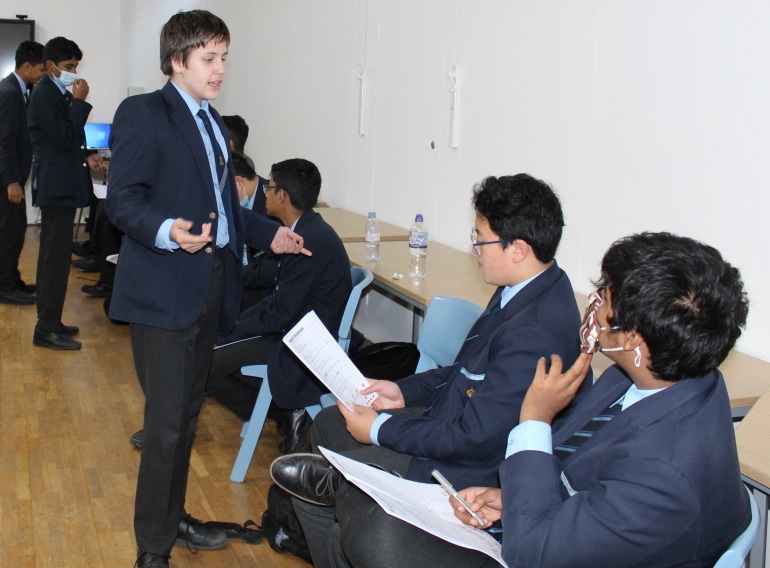
Twenty-four boys from Year 10 had the opportunity to learn how to compose a speech from scratch and then deliver it with confidence in front of classmates in a day-long workshop at the School.
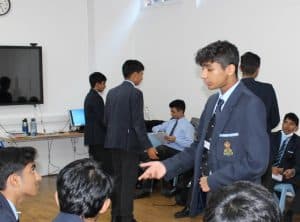 The boys learned about the importance of the three corners of the Communication Triangle – delivery, content and structure – in making a successful speech. They gained insights into overcoming nerves and tips on how to listen and give constructive feedback to each other.
The boys learned about the importance of the three corners of the Communication Triangle – delivery, content and structure – in making a successful speech. They gained insights into overcoming nerves and tips on how to listen and give constructive feedback to each other.
The event, run by Jack Petchey’s ‘Speak Out’ Challenge!, was led by author, coach and speaker Hari Kalymnios. Four participants from each of the six forms in Year 10 were nominated for the workshop by their form teachers.
Extra-curricular Enrichment Tutor Oliver O’Gorman, who organised the day, said: “This was a fantastic opportunity for a select group of Year 10 boys to develop their confidence speaking in front of their peers, as well as learning some top tips for public speaking.”
Jack Petchey’s ‘Speak Out’ Challenge! is supported by the Jack Petchey Foundation, which is named after entrepreneur and philanthropist Sir Jack Petchey and was established with a brief to inspire and motivate young people across London and Essex. The challenge involves an annual public-speaking competition with a number of rounds culminating – in normal non-Covid years – in a Grand Final held in London’s West End at which participants speak in front of an audience of around 1,000, including MPs, mayors and other leaders.
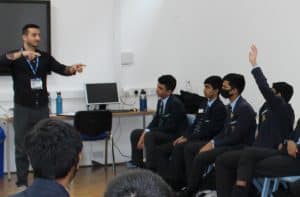 The workshop, which was held in QE’s Conference Centre, included an opportunity for each boy to deliver a speech to the group on any subject of their choice.
The workshop, which was held in QE’s Conference Centre, included an opportunity for each boy to deliver a speech to the group on any subject of their choice.
One of the boys involved, Abdullah Khalid, said: “I really enjoyed participating. I learnt how to control my breathing whilst doing a speech, which I found really useful. I hope we can do something similar again!”
Those reaching the final held on the day as part of an assembly were Victor Shyptur, speaking on Winston Churchill, Ethan Nauth (the US election), Aman Padala (Leaving things to the last minute) and Moniejan Pagareethan (Laziness). Topics selected during the day covered areas including mental health, politics, sleep, video games and social media.
The workshop leader, Mr Kalymnios, has a degree in Physics and has worked in sectors from Law to financial services, and for employers from Accenture to Sainsbury’s. He also spent three years travelling the world.
He became fascinated with what it took to become a high-performance leader and has studied experts from a wide-ranging set of industries, as well as looking at topics from nutrition, practical psychology and personal development, to science, spirituality and business.

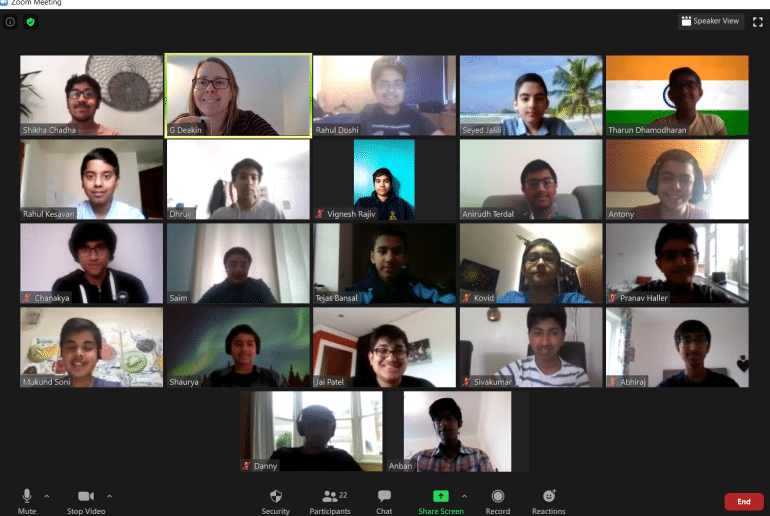
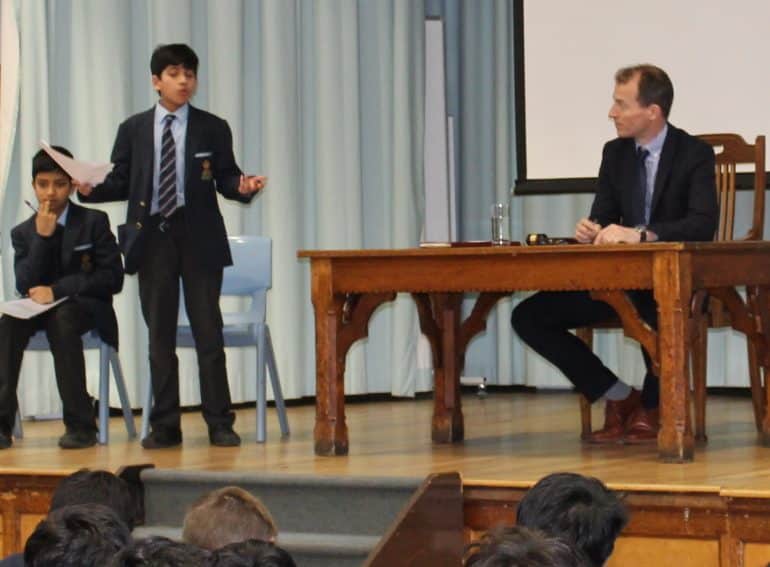
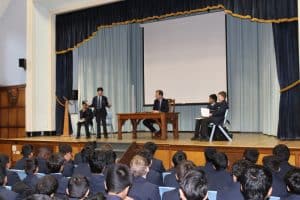 Broughton proposed the motion: This house believes that climate change is the biggest danger facing the modern world. The debate took place just before the current Coronavirus crisis erupted globally.
Broughton proposed the motion: This house believes that climate change is the biggest danger facing the modern world. The debate took place just before the current Coronavirus crisis erupted globally.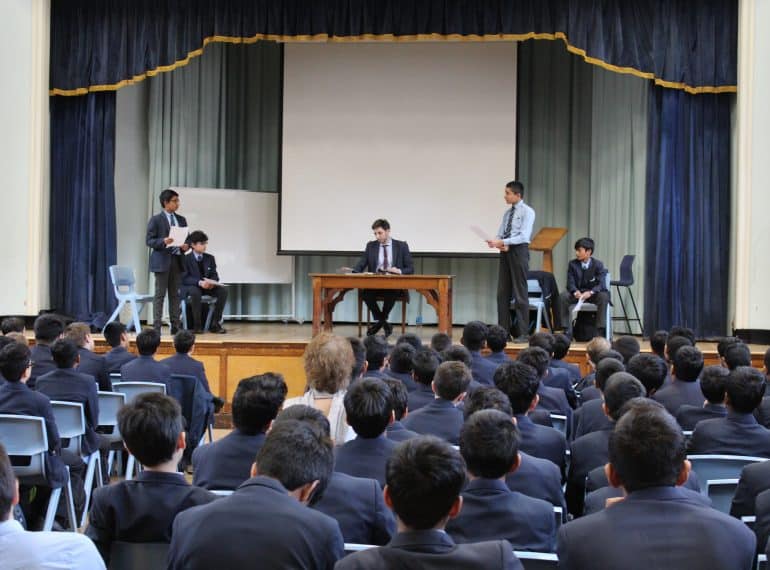
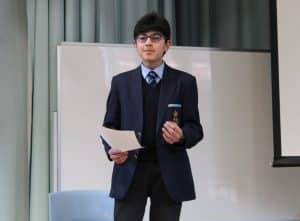 Zaki Mustafa, the first main speaker for Stapylton, presented the proposition in his allocated five minutes. He argued that freedom of speech is a pillar of democracy and a key human right, adding: “Democracy means that we decide how our country is run – the government is there to implement our decisions, not to make them.”
Zaki Mustafa, the first main speaker for Stapylton, presented the proposition in his allocated five minutes. He argued that freedom of speech is a pillar of democracy and a key human right, adding: “Democracy means that we decide how our country is run – the government is there to implement our decisions, not to make them.”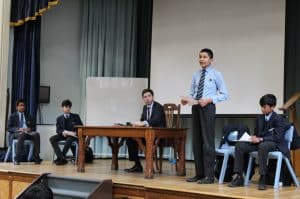 Ady added that censorship is needed in many key areas of society, including the internet, television, film and the media, and that, without censorship, children could search online for information about pornography and buying drugs. Democracy necessarily “includes censorship and we should use it to make the world a better place”, Ady concluded.
Ady added that censorship is needed in many key areas of society, including the internet, television, film and the media, and that, without censorship, children could search online for information about pornography and buying drugs. Democracy necessarily “includes censorship and we should use it to make the world a better place”, Ady concluded.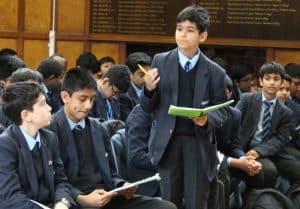 Three speakers from each side raised points or questions from the floor. For Stapylton, Joel Swedensky, Harrshiv Vyas and Akshat Bajaj touched on the importance of educating people with negative or hateful views rather than just silencing them. Leicester’s floor speakers, opposing the motion, were Abhay Halyal, Nikhil Mark and Pranav Haller, who cited as an example of the serious dangers of an absence of censorship the fact that terrorists can learn to make bombs online.
Three speakers from each side raised points or questions from the floor. For Stapylton, Joel Swedensky, Harrshiv Vyas and Akshat Bajaj touched on the importance of educating people with negative or hateful views rather than just silencing them. Leicester’s floor speakers, opposing the motion, were Abhay Halyal, Nikhil Mark and Pranav Haller, who cited as an example of the serious dangers of an absence of censorship the fact that terrorists can learn to make bombs online.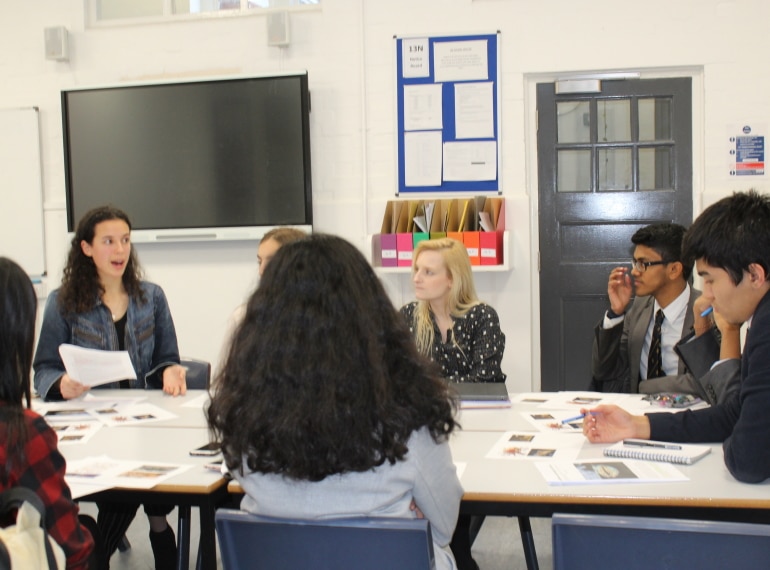
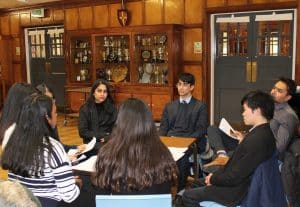 The event, hosted by QE, is an important means of helping final-year pupils with their applications to university, said organiser Nisha Mayer, who is QE’s Head of Pupil Enrichment.
The event, hosted by QE, is an important means of helping final-year pupils with their applications to university, said organiser Nisha Mayer, who is QE’s Head of Pupil Enrichment.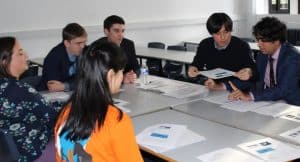 Mr Bonham-Carter added that the symposium participants should not be afraid to ask if they had any questions, “as it was unlikely they would be alone”.
Mr Bonham-Carter added that the symposium participants should not be afraid to ask if they had any questions, “as it was unlikely they would be alone”.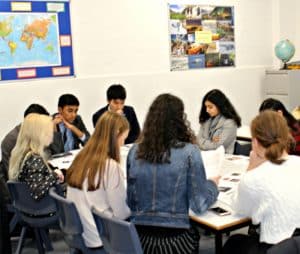 “Of course, the stimulation of the source material is challenging in its own right, whether it is developing critical listening skills from studying Prokofiev and Tchaikovsky with Year 7, enabling Year 9 students to evaluate philosophical arguments, or challenging our sixth-formers to consider the nexus between water and community in a geographical study.
“Of course, the stimulation of the source material is challenging in its own right, whether it is developing critical listening skills from studying Prokofiev and Tchaikovsky with Year 7, enabling Year 9 students to evaluate philosophical arguments, or challenging our sixth-formers to consider the nexus between water and community in a geographical study.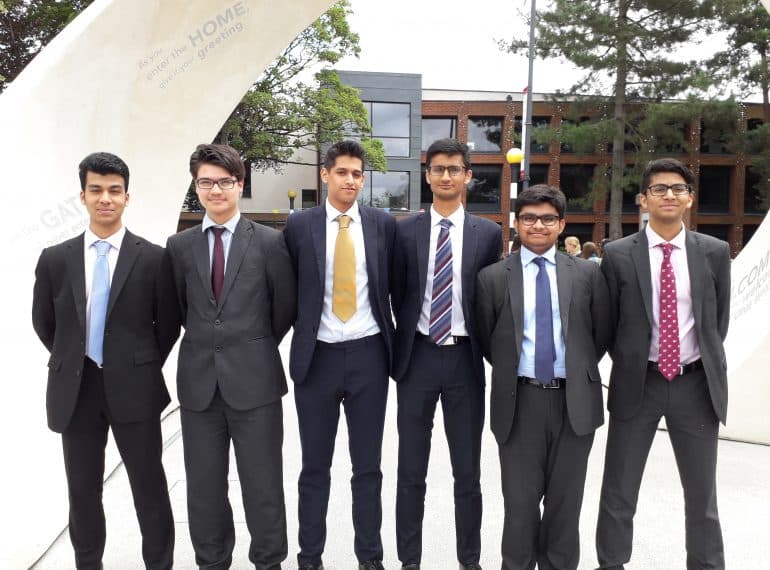
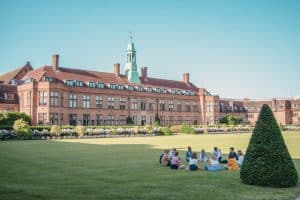 Having won their places with a barnstorming performance at the South East Regional Session – the third consecutive year in which QE has progressed – the Year 12 team were well-prepared for the four-day national event at Liverpool Hope University, for which the theme was Tomorrow’s Europe: Making every voice heard.
Having won their places with a barnstorming performance at the South East Regional Session – the third consecutive year in which QE has progressed – the Year 12 team were well-prepared for the four-day national event at Liverpool Hope University, for which the theme was Tomorrow’s Europe: Making every voice heard. The team also broke new ground for QE, at least over recent years, by taking part in the session’s Saturday-night ‘Euroconcert’. “Introduced by the organisers as ‘the UK’s hottest new boy band, the whole team gave an enthusiastic and tuneful performance of the Backstreet Boys’ I want it that way. Frontman Saifullah Shah stole the show and really engaged the audience!”
The team also broke new ground for QE, at least over recent years, by taking part in the session’s Saturday-night ‘Euroconcert’. “Introduced by the organisers as ‘the UK’s hottest new boy band, the whole team gave an enthusiastic and tuneful performance of the Backstreet Boys’ I want it that way. Frontman Saifullah Shah stole the show and really engaged the audience!”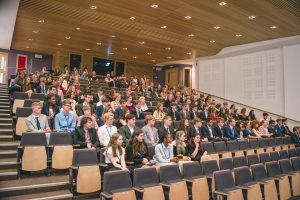 In the session devoted to the first of the two Committees on Employment and Social Affairs (‘EMPL1’), delegates debated the isolation of the elderly. Deeps Gandhi was among a committee that submitted a motion which, inter alia, urged EU member states to appoint a minister for loneliness and subsidise care for the elderly by providing means-tested financial aid to families.
In the session devoted to the first of the two Committees on Employment and Social Affairs (‘EMPL1’), delegates debated the isolation of the elderly. Deeps Gandhi was among a committee that submitted a motion which, inter alia, urged EU member states to appoint a minister for loneliness and subsidise care for the elderly by providing means-tested financial aid to families.